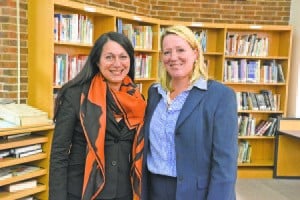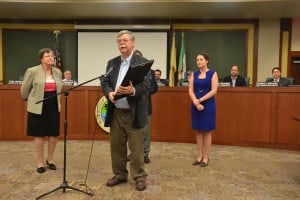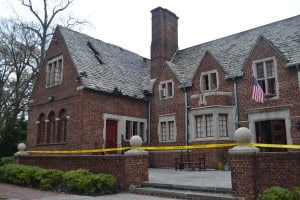
This year in Moorestown saw some news on the Moorestown Township Public Schools superintendent search, the township’s water wells and water infrastructure, old library demolition, Moorestown Community House fire and many other happenings. As Moorestown moves toward a new year, here’s a recap of just some of the events that made headlines in The Sun throughout 2015.

Moorestown Township schools general happenings
• The Moorestown Board of Education reorganization meeting on Jan. 7 welcomed some new faces to the board and named a new president and vice president. Former vice president Kathy Goldenberg was appointed president, and David Weinstein was appointed vice president. The board welcomed new members Peter Palko, Ann Marie Reyher and Caryn Shaw, who were elected in November 2014.
The November elections for this year ended up being uncontested as incumbents David A. Weinstein and Brandon Pugh are returning to the board and newcomer J. “Harry” Faunce will be welcomed to the board. Faunce will be replacing board member Sheryl Sawin, who decided not to run for re-election.
• The BOE passed the 2015–2016 budget with an 8–1 vote, Brandon Pugh voting against it, on April 29. With this budget, the average Moorestown homeowner, with a home assessed at $446,500, will pay an additional $237.38 per year in school taxes.
The budget was projected at $65.4 million in expenditures and $64.3 million in revenue. The board said the projected $1.1 million deficit would be made up by using a Spending Growth Limitations Adjustment of $683,601 for health-care costs as well as the use of $390,442 in banked cap from the 2012–2013 budget.
• For all of her hard work, Goldenberg received two awards for her high level of Board of Education training. She received the Board Member Academy Award and is now officially recognized statewide as a certificated board member. She was also the recipient of a surprise award Certificate of Special Congressional Recognition given by Rep. Tom MacArthur, from the third Congressional District.

OLGC School named Blue Ribbon School
Three hundred thirty five schools across the nation were recognized as National Blue Ribbon Schools this year, based on overall academic excellence or progress in closing achievement gaps among student subgroups. Our Lady of Good Counsel School was named one of those.
U.S. Secretary of Education Arne Duncan recognized OLGC as a 2015 National Blue Ribbon School on Sept. 29. Of 50 private schools recognized as National Blue Ribbon Schools, OLGC is just one of eight from New Jersey to receive this award.
OLGC is the first Catholic school in Burlington County to receive this distinction in the 33-year history of the program.

Superintendent resigns; interim appointed
In late July, it was announced that superintendent Timothy J. Rehm would resign effective Oct. 26. At the next BOE meeting, on Aug. 11, he announced he would be leaving at the end of the month, two months earlier than expected.
Rehm was the third superintendent who has left the school district within the past three years. The BOE held a special meeting on Aug. 25 appointing Fraser as the superintendent search consultant and Lynn Shugars as acting superintendent. Shugars remained acting superintendent until Dec. 1, when at a BOE special meeting, the board unanimously voted in favor of naming director of curriculum and instruction Carole L. Butler as interim superintendent of schools. Butler’s contract as interim is effective from Dec. 1 to July 1. Butler said she is interested in becoming the permanent superintendent.
The board intends to conduct and complete its search for a permanent superintendent with the objective of appointing someone to fill the position as of July 1.
Bond referendum construction continues
The Building Excellence Referendum was proposed earlier in 2014. It had two questions where the first asked for the approval of work that includes $37.6 million of improvements to aging infrastructures at schools for exterior renovations, interior renovations, HVAC upgrades, and electrical/security and technology upgrades. The second asked for an additional $5.2 million for patching and paving of driveways and parking lots at the schools, cafeteria table replacements at George C. Baker School, carpeting and flooring replacements at UES, theater improvements and athletic fields improvements. Under the ROD grant program, the district received 37 percent aid reimbursement on Question 1, but no aid on Question 2 projects.
Since the approval, New Roads Construction and Garrison Architects have been working along with school district administration to get these projects up and running. For the public’s benefit, Robert Notley of New Roads Construction had put together a calendar of construction, which started in June.
To view the full construction calendar, go to the school district’s website at www.mtps.com and click the link under Construction Calendars. A calendar for each school is available there.

PARCC test refusals and results
In the 2014–2015 academic year, New Jersey adopted the Partnership for Assessment of Readiness for College and Careers assessment to replace the HSPA and previous assessments in the elementary and middle schools, based on the Common Core standards. PARCC tests were split into English/language arts and math sections and taken by students in third to 11th grade. The assessment system was to determine whether students were “on track” for college or career readiness.
For PARCC testing in 2014–2015, testing was eight to 10 days; testing occurred over two weeks in March and April/May; testing was computerized; no model essays or student test samples were available to guide learners; and multiple days of test preparation were required for students to learn how to navigate the Pearson system.
At the January BOE meeting, parents came out questioning the district’s policy for refusals. New Jersey has a no-opt-out policy for the test, but students are able to refuse to take it. However, for students who choose that option, what was left for students to do, some parents feared, was nothing but sit and stare.
Rehm said the board was not going with a “sit and stare” policy, but did realize from feedback of the forums about PARCC that the protocol needed to be updated. The board didn’t want to put students in an uncomfortable situation and decided to put them in a supervised environment where they could do educational work or read on their own.
Not much was heard about the implementation or results for PARCC until the December BOE meeting. Butler and Language Arts/English Supervisor Susan Tosti gave the Moorestown Township Public Schools Board of Education a presentation on the district PARCC scores, covering student participation, district scores compared to state scores, how the data will be looked at and changes for the next PARCC testing in 2016.
Overall, MTPS performed either at or above the state scores.
The presentation also revealed that 30 percent of students who were able to take the test refused, the highest being in the high school with 67 percent or less of students in each grade level taking the exams.
The district will use the PARCC data to identify strengths and gaps that exist in curriculum and instruction, inform the conversations of educators when discussing student progress and discuss where additional professional resources are needed to meet learning needs.
Test changes for this academic year include one testing window, 90 minutes overall reductions to tests and fewer test units. Test units were also reduced to three English/language arts units and three or four math units.
School district works on strategic plans

The BOE approved the broad-based strategic plans at its meeting on Sept. 15. The strategic plans were approved with an 8–1 vote, with board member Palko being the one vote against as he felt the goals were too generic and not measurable.
The strategic plans stated the vision was to “enhance our academic, emotional and social foundations while creating a collaborative learning environment which fosters global awareness through personal opportunities and individual growth.”
There were three broad-based goals to establish a culture of innovation to facilitate authentic growth and development of engaged, dynamic and productive learners; provide resources, targeted instruction and interventions tailored to learners’ foundational needs at all grade levels; and design opportunities that promote self-awareness, confidence, personal responsibility and social mindfulness to provide the foundation for competent local and global citizenship.
The broad-based goals are to be used as a guiding point. The specific actions would be created from each of those goals in smaller committees.
From theses goals, committees were made for each goal. Timelines were implemented and action plans developed by each committee. The work will produce action plans that will be helpful and used for planning and decision-making purposes for following years.
The chairs of each goal committee will continue to come back to the board with updates as they go through the process of breaking down each of the goals.
General township happenings
• The decision on using the surplus money from liquor license sales for tax relief was unanimously approved by council on Jan. 30, with the exception of Councilman Phil Garwood, who was absent.
The next month, council passed two resolutions after pulling them from the consent agenda to hold public hearings. Both resolutions were for the transfer of liquor licenses for Moorestown Beverage to Harvest Moorestown and Moorestown Beverage to Yard House USA.

• Representatives from Commercial Utility Consultants came before council to present an energy aggregation proposal. Having been to other townships throughout Burlington County, they talked about the advantages of a bigger group buy-in that would benefit the county as a whole.
According to the CUC representatives, residents should see a minimum of a 5 percent savings. Other counties have seen savings from 5 percent to 13 percent.
PSE&G provides Moorestown residents with power as supplier and delivery agent. Under the proposal, a third-party supplier would provide the energy to commercial, business and residential buyers, and PSE&G would still act as the supplier.
Residents who are with PSE&G would automatically be enrolled in the program. They have 30 days to opt out of the plan, but residents can opt in or opt out at no charge at any time, depending on their meter reading cycle, according to the CUC representatives.
Residents who currently have a third-party supplier would not be considered as part of the program, but they can opt-in at any point once their current contract expires.
Council unanimously approved entering the aggregation program at the next meeting.
• The county has created a program called Shop Burlington County First, which encourages businesses and residents to shop local. Council was given a presentation on the program at the March 9 meeting by Dave Wyche, a shared-services coordinator for the Burlington County Office of Economic Development and Regional Planning under the Burlington County Bridge Commission. He urged residents, businesses and officials to make a pledge to shop local and give the buy-local program a try.
For a business to be accepted into the program, the only financial requirement is for it to be a part of the local business association. The Moorestown Business Association has already accepted the program, so members are encouraged to join. They just need to go to the website at shopburlingtoncounty.com and sign up as a member. When a business signs up, it is automatically put into the directory on the Shop Burlington County First website.
Members of council thought it was a great idea and said they would encourage local businesses to sign up.
• The township launched its new website in May. The website is meant to be more aesthetically pleasing, user-friendly and easier to navigate.
• Council passed the 2015 municipal budget on second reading in a 3–1 vote on May 18. With the 2015 budget, residents saw a 2 percent tax rate increase.
The total multipurpose tax is $0.412 cents, which is a total increase of eight-tenths of a cent. That represents a $36 annual increase for the average assessed home. The 2 percent increase was made up of a 1 percent increase for the library budget, which is a state requirement, and a 1 percent increase of the municipal budget.
The library budget is determined by the township’s evaluation. Because the town has its own library, and the evaluation of the town has gone up, they are required by law to have the 1 percent increase.
The township used $2.03 million in surplus this year, which is $85,000 less than last year, leaving $5 million remaining in surplus.
No staff or services were cut from the budget.

• Last year, a concern about the Moorestown Library motto was brought up when a citizen revealed to council that Google translate said the words “Nos Secundus Coniecto Omnia” meant, “we second guess all.” The motto was meant to say “We confirm all things twice.”
Due to the ambiguity of the phrase, the township decided to change it and held a contest for students in Moorestown schools to come up with a new motto for the library.
Out of all of the entries, the phrase “Scientia Incipit Hic” was chosen, which means “Knowledge Begins Here.” That will be the new Latin motto on the Moorestown Library, thanks to a winning contest entry from a Moorestown Friends School fifth grader Lauren Articolo.
• In the winter of 2014, Township Manager Scott Carew and Napolitano expressed their desire to create a committee that would work to make Lenola a business district.
In 2015, Lenola Center District Ad-Hoc Committee members were chosen and announced to be Carew, Napolitano, Councilman Manny Delgado, Lenola Advisory Committee Chairwoman Jamie Boren, Director of Community Development Tom Ford and community member David Hess.
The Ad-Hoc Committee worked to accomplish some much-needed things in the Lenola section of Moorestown. This included a bus stop at Camden Avenue and some visioning workshops for the future of the Lenola Business District. The latest was Dec. 17, with more planned for the future.

• The Sustainable Moorestown Green Team was established as a permanent advisory committee in Moorestown over the summer. Since then, it hosted a Green Fair in September and earned Moorestown their second silver level in sustainability.
• Moorestown Township Council on Sept. 21 was given a presentation by Steven F. Lennon, senior landscape architect with Taylor Design Group, on conceptual plans for a dog park at Swedes Run Fields. A resolution was on the agenda that night authorizing an application for grant funds of up to $250,000 from the Burlington County Municipal Park Development Program for the dog park. After the presentation, council unanimously approved the resolution.
• Moorestown Police Director Harry Johnson passed away in April at the age of 62 due to heart failure. Lt. Lee Lieber is serving as the acting police director since his passing.
In November, council approved an ordinance that would replace the position of police director with a police chief. For the position of police chief, according to the ordinance, the chief would have full charge and control of the apparatus and equipment of the department and its assignment and use, and would be held responsible for its care, cleanliness and safekeeping, and render a strict account thereof when called for by the township manager.
A police chief would also be able to go out on the streets and meet with the public, being a representative of the department to residents.
Moorestown also approved an ordinance that would set the police chief’s salary between $110,000 and $165,000. The longevity cap is set at $8,580.
There is a civil service process the township must go through to determine the permanent chief. The process to appoint the police chief will take place in 2016.
Council members appointed make history, Newcomer resigns

At the council’s reorganization meeting on Tuesday, Jan. 6, Napolitano, at the age of 26, became the youngest Moorestown mayor, and perhaps the youngest female New Jersey mayor ever, while newly-elected Councilman Delgado became the council’s first member of Hispanic descent.
Also on that night Garwood was selected as deputy mayor and Stacey Jordan was reappointed to the council joining lone Democrat Newcomer. All council members voted “yes” for Napolitano to be mayor and Garwood to be deputy mayor, except Newcomer who abstained to both.
At the council meeting on Nov. 30, Newcomer announced his resignation, “effective immediately,” much to the shock of council and the public.
Newcomer made the announcement early in the meeting, citing his health and wanting to spend more time with his family for reasons for leaving. Newcomer received a kidney transplant earlier this year.

Newcomer was honored with a proclamation at the December council meeting for all of his hard work and dedication to the township.
Council planned a special meeting for the appointment of Newcomer’s replacement for the rest of his term on Dec. 23. The Moorestown Democratic Committee submitted three names for council’s consideration. They were Michael Babcock, Amy Leis and Lisa Petriello.
At the meeting, Petriello was unanimously decided upon and sworn in to finish Newcomer’s term on council.
Moorestown seeks to improve water treatment, clean wells
Not much was heard about the two wells closed because of Trichloropropane (TCP 1,2,3), an unregulated compound, being found in the drinking water in October 2014. That is until an April council meeting where a resident came asked if the wells would be turned on anytime soon.
Members of council assured him the wells are remaining closed as it decides what the appropriate treatment would be. Township Attorney Anthony Drollas said they’ve been working on the wells and they closed them not because they were told to, but as a precaution.
At a meeting in May, council unanimously approved an ordinance for the appropriation of $250,000 and issuance of $237,500 in bonds or notes for preliminary engineering and feasibility study expenses for improvements to the water treatment plants. This study will be conducted on the three water treatment plants in the township, the North Church Street, Kings Highway and Hartford Road plants. The township is studying how water that contains levels of Trichloropropane (TCP 1,2,3) should be remediated and how to update the plants so they could all be up and running by 2020.
At a special council meeting on June 16, township administrator Scott Carew announced Well 7 tested as a non-detect for TCP 1,2,3 and would be turned back on the next day and tested on a monthly basis. Well 9 still tested positive for the TCP 1,2,3 and would be put on a pilot program for possibly the next two years.

According to township utilities engineer L. Russell Trice, senior associate at Alaimo Group, Consulting Engineers, the pilot plan for Well 9 — which runs 30 feet deeper into the ground than Well 7 — would be done on a small scale in a trailer with the most likely treatment being carbon absorption. Samples during this testing will be done on a weekly basis for four weeks. After that, it will take another four weeks to get the results and another few weeks to finalize the report for the township to review. From there they will go into design, which could take about a year.
In total, the process should take roughly two years, according to Trice, but the results of the treatment would be immediate.
At the same time, the township is interested in the removal of other substances found in the wells, which include trichloroethylene (TCE), manganese and other radiological contaminants. According to Trice, manganese is regulated for aesthetic reasons, and the TCE and radiological elements are not above the maximum contaminate level. However, the township wanted to have these treated so Moorestown would have clean water pumped to houses.
At that point, with the wells off, the township had paid $400,000 more last year from New Jersey American Water and $1.2 million so far this year, according to Carew. But, with Well 7 being turned back on, Carew believes the township would be able to recapture some of the cost later in the year by turning off NJ American Water and exclusively using Well 7.
According to Carew, in 2020, the township’s contract with NJAW would be up and it would like to have more efficient operating water treatment plants so it can reduce the need for a contract with NJAW.
In August, council also approved the ordinance about the Kings Highway Water Treatment Plant. The plant was one of three the township was studying in response to concerns about the discovery of high levels of the unregulated compound Trichloropropane (TCP 1,2,3) in the water.
The ordinance called for the appropriation of $710,000 and the borrowing of $675,600 to be used for preliminary engineer and design expenses. According to Carew, the township has put money for this ordinance in this year’s budget.
The Kings Highway Water Treatment Plant is not the principal water treatment plant, however it is used as a secondary water source to pump during the summer months when demand is high. The township plans to update all of its plants so it will eventually save money in the long run. NJAW charges $3 to every $1 the township charges for water, Carew said.
In August, a Water Consultant Report determined the risk of using the wells while treatment was put into place. The results came back with the potential for non-cancer risks being low and all estimated cancer risks below the EPA target.
The report is an expert evaluation of the health risk levels of using wells 7 and 9 within the context of the TCP 1,2,3.
Just after the report was made public, a reading of 0.07 parts per billion of TCP 1,2,3 was found in well 7. Upon conferring with the NJDEP, the township decided it would keep the well on and will continue to monitor it monthly.
In November, an ordinance to replace various water mains was approved, calling for the appropriation of $1.65 million and the issuance of $1.57 million in bonds or notes. The replacement of the water mains include those along North Church Street from Main Street to Central Avenue; Prospect Avenue from South Church Street to High Street; and Second Street from Locust Street to Camden Avenue.
Moorestown Utility Superintendent Bill Butler gave a presentation on the utilities department in the township, saying there have been 43 water main breaks in Moorestown, which is very high, as Moorestown will usually see about 15 breaks per year.
“The reason (for the breaks) is the water from New Jersey American Water, the water density is heavier than our water… they get the water from Delaware River … the density of the water is heavier,” Butler said.
The water main repairs fall in line with planned upgrades at the township’s water treatment plants. It is looking to improve the treatment plants on Kings Highway and Hartford Road and have everything running by 2020.
Residents asked why the township hasn’t been maintaining the water infrastructure in town. If it had taken care of things in the first place, then it might not be where it is today, the residents said.
Carew said he, along with the current council, couldn’t be blamed for the problem. However, he acknowledged that in the past, Moorestown has missed opportunities to invest in water infrastructure. This council is now taking the initiative and working to fix the issue now.
The pilot on well 9 was recently completed and in the New Year council will continue to work on the water infrastructure rehabilitation as well as getting bids for the treatment of wells 7 and 9.
Old library demolition will happen in 2016

In early fall, Moorestown Theater Company’s Producing Artistic Director Mark Morgan spoke to council about the possibility of using the old library location as a performing arts center. Morgan said that MTC would raise the funds for the building and have it be a township building on township land, with MTC renting it. MTC proposed having its performance dates chosen first, about 16 to 20 weekends per year, and the rest open to other performances from other organizations, individuals and the township itself.
He suggested if this was a possibility to create a committee to work on the project. Members of the public were in support of a performing arts center, but felt it should be open to all kinds of visual performing arts and not have MTC have control of the building. No decision was made, but council members expressed their thanks.
Just a few weeks later, council unanimously approved awarding a contract for the demolition of the old library at the Oct. 19 meeting. The contract was awarded to Meco Demolition Inc. in the amount of $421,133.77. The demolition was to be in two phases, one this fall and one in the spring of 2016.
The demolition was delayed due to asbestos being found in the building. Due to the special nature of how the asbestos must be treated, a resolution of a change order in the contract of $70,045.92 was on the agenda and approved by council. According to Garwood, the demolition would officially start on Jan. 11.
Moorestown Community House still stands despite fire

A two-alarm fire ripped through the Moorestown Community House in the heart of the Moorestown community on Dec. 17.
The fire started just before 5 p.m. in the attic of the MCH, according to Chris Chesner, Moorestown Fire Department district administrator and public information officer. The fire department was quick to arrive on scene, along with many surrounding area fire departments, and the fire was deemed a two-alarm fire.
Despite staff, swimmers and dancers being in the building at the time, no one in the building was injured, as Eric Tieniber who called to report the fire and Moorestown police notified those in the building and got everyone out before the alarms went off.
The department was directed by MCH executive director Brad Kenney, also a volunteer firefighter, about the best way to go into the building to put out the fire, causing as little damage as possible.
The fire was placed under control approximately an hour later. The cause of the blaze was electrical, according to Moorestown Fire Official Matthew Orsini.
There was fire and charring damage in the attic area, as well as water and smoke damage. The floors below suffered water and smoke damage. However, it is all repairable. The ballroom and garden room were not affected.
The smell of burnt wood and smoke still filled the air around the MCH the day after, but repair companies were already on the scene looking at the damage and seeing what can be done to repair the landmark.
Kenney wanted residents to know that the Board of Trustees was diligent in its job and has insurance on the building, which Kenney expects should cover the cost.
Anyone interested in helping out were encouraged to visit and donate to the Moorestown Community House Restoration Campaign that was started earlier this year at www.ourcommunityhouse.com.

The MCH received an outpouring of offers to help after the fire, including current and former residents, businesses, churches and even the town council.
At the December council meeting, Tieniber and other emergency responders who helped on the scene during the fire were honored with proclamations. The township also donated $2,750 to the MCH to help with the restoration.


